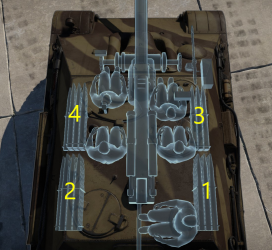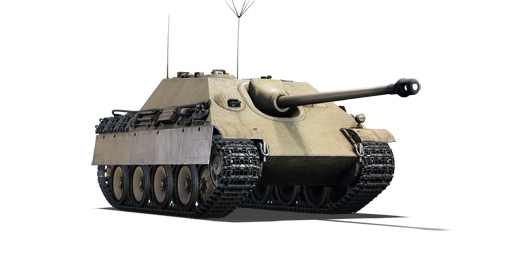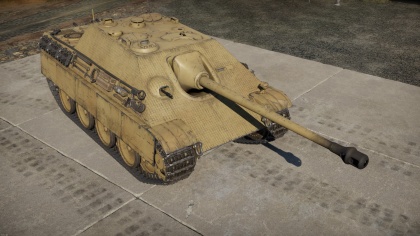Difference between revisions of "Bfw. Jagdpanther G1"
m (→Ammunition: Updated shell penetration and shell names) (Tag: Visual edit) |
Colok76286 (talk | contribs) m (→Mobility: Added arcade HP when spaded) |
||
| Line 63: | Line 63: | ||
|''Arcade'' | |''Arcade'' | ||
|994 | |994 | ||
| − | | | + | |1,224 |
|- | |- | ||
|''Realistic/Simulator'' | |''Realistic/Simulator'' | ||
| Line 77: | Line 77: | ||
|''Arcade'' | |''Arcade'' | ||
|21.61 | |21.61 | ||
| − | | | + | |26.61 |
|- | |- | ||
|''Realistic/Simulator'' | |''Realistic/Simulator'' | ||
Revision as of 16:36, 5 February 2020
Contents
| This page is about the premium German tank destroyer Bfw. Jagdpanther G1. For the regular version, see Jagdpanther. For the other vehicles of the family, see Panther tank (Family). |
Description
The Panzerbefehlswagen Jagdpanther Ausf.G1 is a premium rank IV German tank destroyer
with a battle rating of 6.3 (AB/RB/SB). This tank destroyer was introduced during the Closed Beta Test for Ground Forces before Update 1.41.
General info
Survivability and armour
Armour type:
- Rolled homogeneous armour
- Cast homogeneous armour (Gun mantlet)
| Armour | Front (Slope angle) | Sides (Slope angle) | Rear (slope angle) | Roof (Slope angle) |
|---|---|---|---|---|
| Hull | 80 mm (55°) Front glacis 60 mm (54°) Bottom glacis |
40 + 5 mm | 40 mm (24-26°) | 25 mm |
| Superstructure | Same as Hull | 50 mm (26-29°) | 40 mm (36°) | 25 mm (85°) |
Notes:
- Suspension wheels and tracks are 20 mm thick, though the interleaved pattern of the wheels provides a cumulative 20 mm of protection.
- Tracks and the lower side of the hull are covered by 5 mm thick armour plate, protecting them from HEAT and HE shells.
- Rear parts of the upper-side hull armour have tracks attached, adding additional 20 mm of armour.
- Belly armour is 20 mm thick.
Mobility
| Mobility characteristic | ||
|---|---|---|
| Weight (tons) | Add-on Armor weight (tons) |
Max speed (km/h) |
| 46.0 | N/A | 60 (AB) |
| 55 (RB/SB) | ||
| Engine power (horsepower) | ||
| Mode | Stock | Upgraded |
| Arcade | 994 | 1,224 |
| Realistic/Simulator | 619 | 700 |
| Power-to-weight ratio (hp/ton) | ||
| Mode | Stock | Upgraded |
| Arcade | 21.61 | 26.61 |
| Realistic/Simulator | 13.46 | 15.22 |
Armaments
Main armament
| 88 mm PaK 43 | |||||
|---|---|---|---|---|---|
| Capacity | Vertical guidance |
Horizontal guidance |
Stabilizer | ||
| 60 | -8°/+14° | ±11° | N/A | ||
| Turret rotation speed (°/s) | |||||
| Mode | Stock | Upgraded | Prior + Full crew | Prior + Expert qualif. | Prior + Ace qualif. |
| Arcade | 7.04 | 9.75 | __.__ | __.__ | 13.93 |
| Realistic | 4.76 | 5.60 | __.__ | __.__ | 8.00 |
| Reloading rate (seconds) | |||||
| Stock | Prior + Full crew | Prior + Expert qualif. | Prior + Ace qualif. | ||
| 11.05 | __.__ | __.__ | 8.50 | ||
Ammunition
| Penetration statistics | |||||||
|---|---|---|---|---|---|---|---|
| Ammunition | Type of warhead |
Penetration in mm @ 0° Angle of Attack | |||||
| 10m | 100m | 500m | 1000m | 1500m | 2000m | ||
| PzGr 39/43 | APCBC | 237 | 234 | 222 | 207 | 194 | 181 |
| Sprgr. L/4,5 | HE | 13 | 13 | 12 | 12 | 12 | 12 |
| Hl.Gr 39 | HEAT | 110 | 110 | 110 | 110 | 110 | 110 |
| PzGr 40/43 | APCR | 272 | 270 | 250 | 228 | 208 | 189 |
| Shell details | ||||||||||
|---|---|---|---|---|---|---|---|---|---|---|
| Ammunition | Type of warhead |
Velocity in m/s |
Projectile Mass in kg |
Fuse delay
in m: |
Fuse sensitivity
in mm: |
Explosive Mass in g (TNT equivalent): |
Normalization At 30° from horizontal: |
Ricochet: | ||
| 0% | 50% | 100% | ||||||||
| PzGr 39/43 | APCBC | 1,000 | 10.16 | 0.8 | 28 | 108.8 | +4° | 48° | 63° | 71° |
| Sprgr. L/4,5 | HE | 820 | 9 | 0.1 | 0.5 | 698 | +0° | 79° | 80° | 81° |
| Hl.Gr 39 | HEAT | 600 | 7.64 | 0.0 | 0.3 | 1,100 | +0° | 62° | 69° | 73° |
| PzGr 40/43 | APCR | 1,130 | 7.3 | N/A | N/A | N/A | +1.5° | 66° | 70° | 72° |
Ammo racks

| Full ammo |
1st rack empty |
2nd rack empty |
3rd rack empty |
4th rack empty |
Visual discrepancy |
|---|---|---|---|---|---|
| 60 | 46 (+14) | 31 (+29) | 16 (+44) | 1 (+59) | Yes |
Left side empty: 31 (+29)
Machine guns
| 7.92 mm MG 34 | ||||||
|---|---|---|---|---|---|---|
| Hull mount | ||||||
| Capacity (Belt capacity) | Fire rate (shots/minute) |
Vertical guidance |
Horizontal guidance | |||
| 3,000 (150) | 900 | -5°/+10° | -10°/+5° | |||
Usage in battles
The Jagdpanther is best used defensively, to cover capture points and prevent their capture, and to cover friendly tank advances. It's highly recommended to hide the lower frontal plate in this tank, as it has a frontal mounted transmission which will set on fire if shot. It is also strongly advised to use this tank to engage at long range, and to change position often.
It is important to keep in mind that the Jagdpanther's armour is sloped. Using it on the side of a hill facing the enemy is extremely dangerous since this would decrease the angle at which the frontal armour is sloped relative to incoming fire and thus negate a large part of the vehicle's defensive capabilities. By hiding behind buildings, trees and bushes, or behind a ridgeline, its fighting capability is optimised. A well positioned Jagdpanther is very hard to destroy. In addition, using the Jagdpanther in a diamond position (with its right side facing the enemy) will mean that your most important crew members are better protected (driver, gunner, commander) since they are all on the left side of the vehicle.
Pros and cons
Pros:
- Good mobility
- Excellent firepower with great long-range sniping abilities
- Armour of a Panther, so adequately armoured
- Unlike earlier Tank destroyers as the StuGs, Jagdpanzer IVs, Marders and Hetzer, it has a crew of five, rather than the typical four
- The front of the Jagdpanther makes it easy to attach a lot of camouflage
- Gunsight has an enhanced zoom level
- Has a fully functional hull machine gun
- Since it is an SPG, it costs fewer spawn points than a normal tank
Cons:
- Poor reverse speed
- Panther hull armour isn't as effective against enemies the Jagdpanther faces. Rounds like the APDS from the 20 pdr can easily penetrate
- Front mounted transmission. Can catch fire and immobilizes vehicle when shot through lower frontal plate
- Like most tank destroyers, it lacks a rotating turret
- A lot bigger than the StuG III, Jagdpanzer IVs, and the Hetzer, so it is more difficult to conceal behind cover
- Penetration from the sides is often lethal, due to the positioning of ammo racks.
History
Development
The formidable 8.8 cm Pak 43 anti-tank gun was created as a longer version of the 8.8 cm Kwk 36. Two attempts were made to fit this gun onto a self-propelled chassis, the first was thePanzerjäger Tiger (P) Ferdinand (later Elefant) and the second was the Nashorn. However, the Ferdinand was too heavy and unreliable while the Nashorn chassis was too small and underpowered to propel such a gun. The Jagdpanther was proposed in late 1942, as a tank destroyer mounting the formidable 8.8 cm Pak 43, built on the Panther chassis with good armour and speed. The tank destroyer was created and designated SdKfz 173 and was demonstrated to Hitler on October 1943. Production then started in January 1944 under the simpler name Jagdpanther, which Hitler preferred over the longer 8.8 cm Pak 43/3 auf Panzerjäger Panther.
Throughout its production life of January 1944 to 1945, a total 415 of these vehicles were made. MIAG produced 270 from January 1944 to the end of the war, MNH produced 112 from November 1944, and MBA produced 37 from December 1944. The supposed goal was 150 Jagdpanthers produced per month, but Germany's deteriorating situation made this impossible. The Jagdpanthers were made in two variants, G1 and G2. The G1 had a small internally bolted main gun and modified Panther Ausf. An engine deck while the G2 had a larger simplified, outer bolted mantlet with a modified Panther Ausf. G engine deck. A proposal to mount the 12.8 cm Pak 80 was considered but never produced.
The Jagdpanther was a rather good design as a tank destroyer. It had a good power-to-weight ratio and had a gun that could penetrate any allied tank in service during the war. It did not suffer from as many reliability problems due to it's basis on the later Panther Ausf. G model, which had fixed most of the Panther's initial problems. It also used an improved transmission and final drive (the two sources of most Panther issues), which were planned for the Panther II.
Command variant
Jagdpanthers were assigned to heavy tank destroyer battalions in the Western Front and Eastern Front, but they required a vehicle to house the commander of each battalion. So during the Jagdpanther's production, a command vehicle variant was also made from the Jagdpanther. These vehicles are distinguishable from regular-issue Jagdpanthers with the presence of more antennas to house the FuG8 30W radio that allows communication between the command tank and headquarters. Each battalion would have access to two Befehlswagen Jagdpanther for use to coordinate the battalion, other units in each battalion is 14 normal Jagdpanthers, 5 Bergepanthers for armour recovery, a repair company, two anti-aircraft platoons, a combat engineer platoon, and an armoured reconnaissance platoon
In-game description
To equip the commanders of tank destroyer battalions, in the summer of 1944 production of a command vehicle based on the Jagdpanther tank destroyer was launched. These command vehicles were equipped with a FuG8 30W radio station with ranges of 10 km (phone) and 50-80 km (Morse key). The transmitter operated on a medium frequency range, from 1130-3000 kHz. The receiver operated in the 835-3000 kHz range. The FuG5 radio station was equipped with a whip antenna with a height of 2 meters, and the FuG8 radio, with a Sternantenne antenna with a height of 1.4 meters.
These vehicles served in detached anti-tank battalions. The organization of these battalions was established by the KStN 1149c government schedule, issued on March 1, 1944. A company consisted of 14 vehicles, and two more Panzerbefehlswagen Jagdpanthers were driven by the company's command staff. Each battalion had 3 companies. An additional maintenance company had 5 Bergepanthers. In addition, each battalion had a repair company, two anti-aircraft defense platoons, a combat engineer platoon, and a reconnaissance armored transport platoon. The command staff of the battalion had two command Jagdpanthers equipped with additional radio stations.
Media
Skin and camouflages for the Bfw. Jagdpanther on War Thunder Live.
See also
- Jagdpanther - Non-premium version of the Bfw. Jagdpanther.
External links
| Germany tank destroyers | |
|---|---|
| Pz. I Derivatives | Panzerjäger I |
| Pz. II Derivatives | 15cm sIG 33 B Sfl |
| Pz. 38(t) Derivatives | Marder III · Marder III H · Jagdpanzer 38(t) |
| Pz. III Derivatives | StuG III A · StuG III F · StuG III G · StuH 42 G |
| Pz. IV Derivatives | Jagdpanzer IV · Panzer IV/70(A) · Panzer IV/70(V) · Dicker Max · Nashorn · Brummbär · VFW |
| Pz. V Derivatives | Jagdpanther G1 · Bfw. Jagdpanther G1 |
| Pz. VI Derivatives | Sturer Emil · Elefant · Ferdinand · 38 cm Sturmmörser · Jagdtiger |
| Wheeled/Half-track | 8,8 cm Flak 37 Sfl. · Sd.Kfz.251/9 · Sd.Kfz.251/10 · Sd.Kfz.251/22 · Sd.Kfz.234/3 · Sd.Kfz.234/4 · 15 cm Pz.W.42 |
| ATGM Carrier | RakJPz 2 · RakJPz 2 (HOT) · Wiesel 1A2 |
| Other | Waffenträger · M109G · JPz 4-5 · Raketenautomat · VT1-2 |
| Germany premium ground vehicles | |
|---|---|
| Light tanks | Pz.II C (DAK) · Pz.Sfl.Ic · Pz.Sp.Wg.P204(f) KwK · Sd.Kfz. 140/1 · Sd.Kfz.234/1 · Ru 251 · SPz 12-3 LGS · TAM 2IP |
| Medium tanks | Nb.Fz. · Pz.III N · Pz.Bef.Wg.IV J · ▀M4 748 (a) · ▀T 34 747 (r) · Ersatz M10 |
| mKPz M47 G · Turm III · Leopard A1A1 (L/44) · Leopard 2 (PzBtl 123) · Leopard 2A4M | |
| Heavy tanks | ▀Pz.Kpfw. Churchill · ▀KV-IB · ▀KW I C 756 (r) · ▀KW II 754 (r) |
| VK 45.01 (P) · ␠Tiger · Pz.Bef.Wg.VI P · Tiger II (H) Sla.16 | |
| Tank destroyers | Sd.Kfz.234/3 · Sd.Kfz.234/4 · Sd.Kfz.251/10 · Sd.Kfz.251/22 · 15 cm Pz.W.42 |
| Brummbär · Panzer IV/70(A) · VFW · Bfw. Jagdpanther G1 · Elefant · 38 cm Sturmmörser | |





